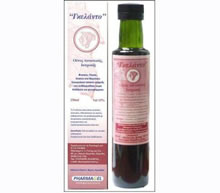
Dictionary of Allergies .. Aspirin induced asthma
Aspirin-intolerant asthma (AIA) is a subtype of asthma induced by non-steroidal anti-inflammatory drugs and characterized by an aggressive mucosal inflammation of the lower airway (asthma) and the upper airways (rhinitis and nasal polyp). The lower airway lesion and the nasal polyp in AIA are postulated to have common pathogenic features involving aspirin sensitivity that would be reflected in the gene expression profile of AIA polyps [3]. 2-4% of the asthmatic subjects notice that aspirin causes them to wheeze. This is not due to allergy to aspirin.
None of the tests for allergy are positive and it is not a specific reaction The CAST-ELISA test seem to be the first reliable in vitro test for diagnosis of aspirin idiosyncrasy, but it should be used rather as a screening procedure, because its negative result do not exclude the presence of drug intolerance [1]. The sensitive of aspirin patient can also be sensitive to nonsteroidal antiinflammatory drugs and also to tartrazine and benzoic acid. All these substances suppress the mechanism of the production of prostaglandins.
Aspirin, the non steroid antiinflammatory drugs except corticosteroids, tartrazine and benzoic acid can precipitate asthmatic attacks in some patients with nasal polyps. The incidence of nasal polyp found in aspirin-induced asthma ranges from 60% to 100%. The asthmatic attacks can be severe and life-threatening. Histologic findings on the polyp show tissue eosinophilia in all patients with aspirin intolerance [2]. Electron microscopically the polyps may demonstrated disappearance of crystalloid electron-dense cores in granules of most eosinophils, although the amorphous matrix of the granules remains [3]. (See Asthma, aspirin induced; Aspirin intolerance; Aspirin sensitivity, Aspirin idiosyncrasy).
References
1. Wolanczyk-Medral A et al: CAST-ELISA test in diagnosis of aspirin idiosyncrasy in chronic urticaria and angioedema.The annual Meeting of the European academy of allergology and clinical Immunology Brussels, Belgium July 3-7, 1999. Allergy, Suppl.52:54:16, 1999
2. Ogino, S., et al: Aspirin-induced asthma and nasal polyp. Acta Otolaryngol. (Stocch) (suppl) 1986;430:21-27.
Sasaki, Y., and Nakahara, H.: Granule core loss in eosinophils from a patient with aspirin-induced asthma: an electron microscopic study. Annals of Allergy, Vol. 63, Oct. 1989, pp. 306-308.
3. Sekigawa T, Tajima A, Hasegawa T, Hasegawa Y, Inoue H, Sano Y, Matsune S, Kurono Y, Inoue I. Gene-expression profiles in human nasal polyp tissues and identification of genetic susceptibility in aspirin-intolerant asthma. Clin Exp Allergy. 2009 Jul;39(7):972-81. Epub 2009 Mar 27.
Γκέλης Ν.Δ. - Λεξικό Αλλεργίας - Εκδόσεις ΒΕΛΛΕΡOΦΟΝΤΗΣ - Κόρινθος 2013
Gelis Ν.D. - Dictionary of Allergies - VELLEROFONTIS Publications - Corinth 2013




